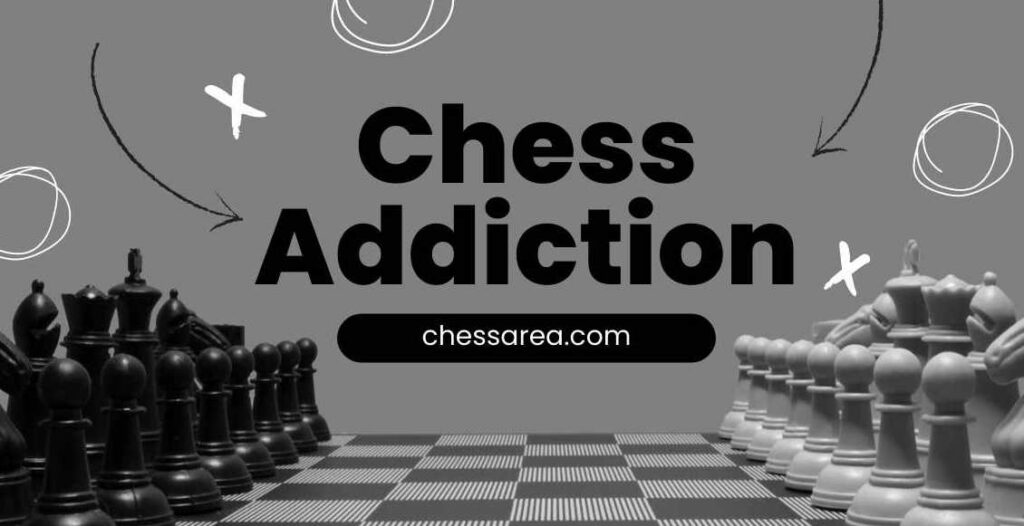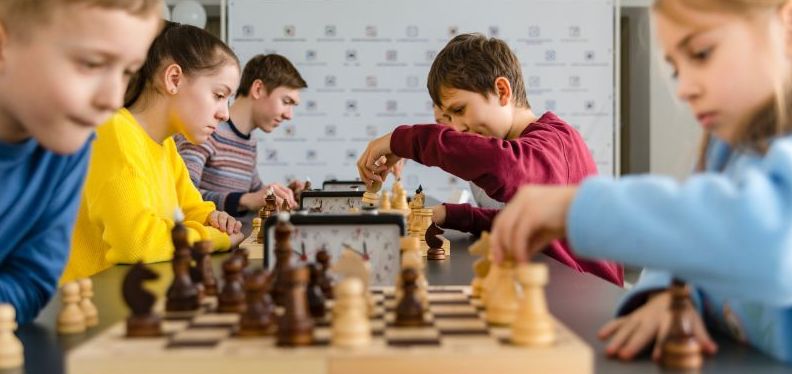Let’s talk about Chess addiction…..
Have you ever found yourself lost in a game of chess for hours on end, neglecting your responsibilities and social life? Well, you’re not alone. We too have fallen victim to the addictive nature of chess. It’s easy to get caught up in the thrill of outsmarting an opponent and making the perfect move. But when it starts to interfere with our daily lives, it’s time to take a step back and reassess our relationship with the game.

Chess addiction is a real thing, and it can have negative effects on our mental and physical health. It’s important to recognize the signs of addiction and take steps to address it before it becomes a bigger problem.
In this article, we’ll explore the reasons why chess is so addictive, the potential consequences of addiction, and what we can do to manage our addiction and enjoy the game in a healthy way.
So, let’s dive in and take a closer look at this fascinating, yet dangerous game.
The Dangers of Chess Addiction
Negative Effects
We all know that playing chess is fun and challenging, but when it becomes an addiction, it can have negative effects on our lives. Here are some of the dangers of chess addiction:

- Social Isolation: When we become addicted to chess, we often spend hours playing alone. This can lead to social isolation and cause problems in our personal relationships.
- Lack of Productivity: Playing chess for hours on end can lead to a lack of productivity. We may neglect our work or studies, which can have serious consequences.
- Physical Health Issues: Sitting in one position for long periods of time can cause physical health issues such as back pain, neck pain, and eye strain.
- Mental Health Issues: Chess addiction can also have a negative impact on our mental health. It can cause anxiety, depression, and stress.
- Financial Problems: If we become addicted to online chess, we may spend money on chess-related purchases such as memberships or tournaments, which can lead to financial problems.
While there are some health benefits associated with playing chess, such as improved cognitive function and memory, it is important to find a balance and avoid becoming addicted.
Managing Your Chess Addiction
Control
We know that it’s not easy to control your urge to play chess, especially when you’re addicted to it. However, we need to find ways to manage our addiction to chess so that it doesn’t take over our lives completely. Here are some tips that can help us control our addiction:
- Set a schedule: Allocate specific times of the day for playing chess. Stick to the schedule and avoid playing outside of those times.
- Limit your playing time: Set a time limit for each game and stick to it. This will help us avoid getting sucked into playing for hours on end.
- Take breaks: After playing for a while, take a break and do something else. This will help us avoid getting too absorbed in the game.
Planning
Planning is key to managing our addiction to chess. Here are some things we can do to plan and stay in control:
- Plan your day: Make a to-do list for the day and prioritize your tasks. This will help us avoid spending too much time playing chess and neglecting other important responsibilities.
- Plan your games: Before starting a game, decide how many games you will play and how much time you will spend on each game. Stick to the plan and avoid getting carried away.
- Plan your breaks: Take breaks at regular intervals and use them to do something else. This will help us avoid getting too absorbed in the game.
Remember, we don’t have to completely give up playing chess. We just need to find ways to manage our addiction so that it doesn’t take over our lives. By following these tips, we can control our addiction and enjoy playing chess without it becoming a problem.
Balancing Chess and Life
When we become addicted to chess, it can be easy to forget about the other important aspects of our lives.
Here are some tips on how to balance chess and life, so we can enjoy both without neglecting one or the other.

Work
We all need to work to make a living, but it can be tough to focus on work when we’re thinking about our next chess move. To balance chess and work, we suggest setting aside specific times for each activity.
For example, we can dedicate our mornings to work and our evenings to chess. This way, we can give our full attention to each activity without feeling guilty or distracted.
Schoolwork
For those of us who are still in school, balancing chess and schoolwork can be a challenge. One way to do this is to use chess as a reward for completing our schoolwork.

For example, we can tell ourselves that we will play a game of chess after finishing a certain amount of homework or studying. This way, we can stay motivated to complete our schoolwork while still enjoying chess.
Exercise
It’s important to take care of our physical health as well as our mental health. To balance chess and exercise, we suggest finding physical activities that we enjoy and that don’t require too much time.
We can take short walks or do quick workouts between chess games. This way, we can stay active and healthy without sacrificing our time for chess.
Overall, balancing chess and life requires a bit of planning and discipline, but it’s definitely possible. By setting aside specific times for work, schoolwork, exercise, and chess, we can enjoy all aspects of our lives without neglecting any of them.
Remember, chess is just one part of our lives, and it’s important to maintain a balance so we can be our best selves in all areas.
Dealing with Opponents
When we’re addicted to chess, it can be easy to forget that we’re not the only ones playing the game. Our opponents also have their own goals and strategies, and it’s important to remember that they’re not just there to satisfy our need for competition.
One of the best ways to deal with opponents is to approach each game with a sense of sportsmanship. This means treating our opponents with respect, even if we don’t like their playing style or personality.

We can do this by shaking hands before and after the game, congratulating them on a good move, and avoiding any trash talk or unsportsmanlike behavior.
Another important aspect of dealing with opponents is to learn from them. Even if we win the game, there’s always something we can learn from our opponents’ moves and strategies. By studying their playing style, we can improve our own skills and become better players overall.
It’s also important to remember that our opponents are not our enemies. They’re just other people who enjoy playing chess, and we should treat them as such. This means avoiding any personal attacks or insults, and focusing on the game itself.
If we find ourselves struggling to deal with a particular opponent, it can be helpful to take a break from playing them for a while. This can give us time to cool off and approach the game with a fresh perspective.
Ultimately, the key to dealing with opponents is to approach each game with a sense of respect and sportsmanship. By doing so, we can enjoy the game of chess and improve our skills, while also building positive relationships with our opponents.
Chess Tournaments and Beyond
Ah, tournaments. The ultimate test of our chess skills. But beware, my fellow chess addicts, for tournaments can be a double-edged sword.
On one hand, they can provide us with a sense of accomplishment and validation. On the other hand, they can exacerbate our addiction and make us lose track of time.

So, how do we navigate this treacherous terrain? Here are a few tips:
- Choose your tournaments wisely: Don’t sign up for every tournament under the sun. Be selective and choose tournaments that fit your schedule and skill level. Remember, the goal is to have fun and improve, not to burn out.
- Set realistic goals: Don’t put too much pressure on yourself to win every game. Instead, set realistic goals such as winning a certain number of games or improving your rating.
- Take breaks: It’s important to take breaks during tournaments to avoid burnout. Use the break time to stretch, hydrate, and clear your mind.
- Stay organized: Keep track of your tournament schedule, game times, and opponents. This will help you stay focused and avoid missing games.
- Don’t forget about life outside of chess: Remember, there’s more to life than chess. Make time for your family, friends, and hobbies outside of chess. Trust us, it will make you a happier and more well-rounded person.
In conclusion, tournaments can be a fun and rewarding experience for us chess addicts. But we must approach them with caution and balance them with other aspects of our lives.
The Importance of Support
As we navigate through our obsession with chess, it’s important to remember that we don’t have to go through it alone. Having a support system can make all the difference in our journey to recovery. In this section, we’ll explore the importance of support from parents and friends.
Parents
Our parents can be a great source of support when we’re struggling with addiction. They may not understand our love for chess, but they can still offer us emotional and practical support. Here are some ways our parents can help us:
- Listen to us: Sometimes, all we need is someone to listen to us without judgement. Our parents can provide us with a safe space to talk about our addiction and our struggles.
- Encourage us: Our parents can encourage us to seek help and support. They can remind us that it’s okay to ask for help and that we’re not weak for doing so.
- Help us find resources: Our parents can help us find resources such as support groups or therapists. They can also help us find other hobbies or activities to replace chess.
Friends
Our friends can also be a great source of support during our journey to recovery. Here are some ways our friends can help us:

- Be there for us: Our friends can be there for us when we need someone to talk to or when we’re feeling down. They can offer us emotional support and encouragement.
- Help us find new hobbies: Our friends can help us find new hobbies or activities to replace chess. They can introduce us to new things and help us find what we enjoy.
- Hold us accountable: Our friends can hold us accountable for our actions. They can remind us of our goals and encourage us to stay on track.
In conclusion, having a support system can make all the difference when we’re struggling with addiction. Our parents and friends can offer us emotional and practical support, and help us find new hobbies and activities to replace chess. Remember, we don’t have to go through this alone.
Conclusions about Chess Addiction
Well, we’ve learned a lot about chess addiction and how to deal with it. We know that it can be a real problem for some of us, and that it can take over our lives if we’re not careful.
But, we’ve also learned that there are ways to manage our addiction and keep it from getting out of control.

First, we need to recognize that we have a problem. We can’t just ignore it and hope it goes away. We need to be honest with ourselves and admit that we’re spending too much time playing chess and not enough time doing other things.
Once we’ve acknowledged our addiction, we can start taking steps to manage it. We can limit our chess playing time, set goals for ourselves, and find other hobbies and interests to pursue. We can also seek support from friends and family, or even join a support group for people dealing with addiction.
But most importantly, we need to remember that it’s okay to have fun and enjoy playing chess. We don’t have to give it up completely, but we do need to find a healthy balance between playing chess and living our lives.
So let’s take what we’ve learned and use it to manage our chess playing habits. We can still enjoy the game, but we can also enjoy all the other things life has to offer.
- Is Chess.com Premium Worth It? - May 25, 2023
- How To Set Traps In Chess? - May 25, 2023
- Chess.com Review - May 25, 2023
